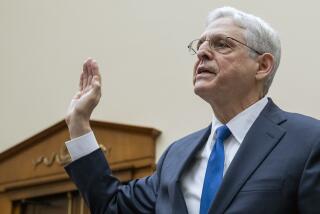Even on Friendly Turf, Hyde Must Defend Probe
- Share via
CHICAGO — Returning to his hometown Thursday, a place where many old-timers call him just plain Hank, Judiciary Committee Chairman Henry J. Hyde (R-Ill.) carried the public debate over impeachment with him from Washington.
Hyde defended his inquiry at a Chicago Bar Assn. luncheon, where he was touted even by die-hard Democrats as someone who will give President Clinton a fair shake. But praise was not everywhere.
The president of the National Organization for Women needled Hyde about his decades-old extramarital affair. And Robert S. Bennett, the president’s private attorney in the Paula Corbin Jones sexual harassment case who stopped in the Windy City, criticized independent counsel Kenneth W. Starr for his contacts with Jones’ attorneys.
The three appearances within hours and city blocks of each other were coincidental, said organizers, but they turned Chicago--which will play host to the president and First Lady Hillary Rodham Clinton in separate appearances today and Saturday--into ground zero on the impeachment controversy.
At the lawyers’ luncheon, Hyde said he is being squeezed by the president’s fiercest critics and most loyal defenders as he struggles to set a middle course on impeachment hearings.
“I would trade it for a Hershey bar,” he said of his job heading an inquiry that has not, and may never, captivate the American people. “Anyone who wants it can have it.”
Of course, Hyde has no intention of giving up the reins of only the third impeachment inquiry in the nation’s history. But he made his point: Not one of the 100 or so lawyers at John Marshall Law School indicated a desire to replace him.
Hyde also downplayed recent polls showing public support for Congress and its handling of the Monica S. Lewinsky case in a nose dive.
Public opinion will be an essential part of the impeachment process, Hyde acknowledged. But he suggested that it will have more influence if the full House votes articles of impeachment against Clinton, which would then be sent to the Senate for trial.
In Washington, retiring Rep. Lee H. Hamilton (D-Ind.), one of 31 Democrats to vote for the impeachment inquiry, said that--even if the House impeaches Clinton--the Senate never will turn him out of office.
“If 60% of the public doesn’t want to impeach him, do you think you’re going to get 67 votes to convict him?” Hamilton asked. “No way. Public opinion drives the process.”
Hamilton said there are only three possible outcomes for the president--resignation, impeachment or a deal.
“You’ve got three bad choices,” he said. “The question is what is the least bad choice. And I think the least bad choice is a deal.”
Next up for Hyde’s committee is a meeting on Wednesday with White House lawyers to talk about possible witnesses, rules of engagement and facts in the case that are not in dispute.
Hyde said his move to consolidate the impeachment counts against Clinton into three broad areas--perjury, obstruction of justice and witness tampering--has been misread by some Republican critics as a retreat.
“We are not dropping any counts,” he insisted. “We are just doing what any trial lawyer would do, given a complicated case.”
But one defense lawyer in the room, Eugene Farrug, challenged Hyde’s high-minded talk about the rule of law.
“People lie under oath all the time,” he said.
Meanwhile, Patricia Ireland, national president of NOW, decried the impeachment inquiry and suggested that Hyde had gotten off easy for his lengthy affair disclosed recently. She spoke at a news conference called by more than a dozen women’s groups to urge support for Sen. Carol Moseley-Braun (D-Ill.) in her struggle for reelection.
Clinton attorney Bennett, in a speech to a downtown business group, cited Starr’s investigation as an example of a new climate of partisan investigative warfare and called for the law establishing independent counsels to be scrapped or at least reformed to limit the time and scope of such investigations.
“Every president has a past,” Bennett said. “Every president has a sex life.”
But none of them deserve to have government agents snooping around to find out the details, he said.
“We must realize that our political leaders are neither angels, nor are they devils,” Bennett said. “Leaders of both parties and their soldiers must call a truce. They must stop seeking political gain by reckless allegations of criminal and ethical wrongdoing.”
*
Times staff writer Richard A. Serrano in Washington contributed to this story.
More to Read
Get the L.A. Times Politics newsletter
Deeply reported insights into legislation, politics and policy from Sacramento, Washington and beyond. In your inbox twice per week.
You may occasionally receive promotional content from the Los Angeles Times.










